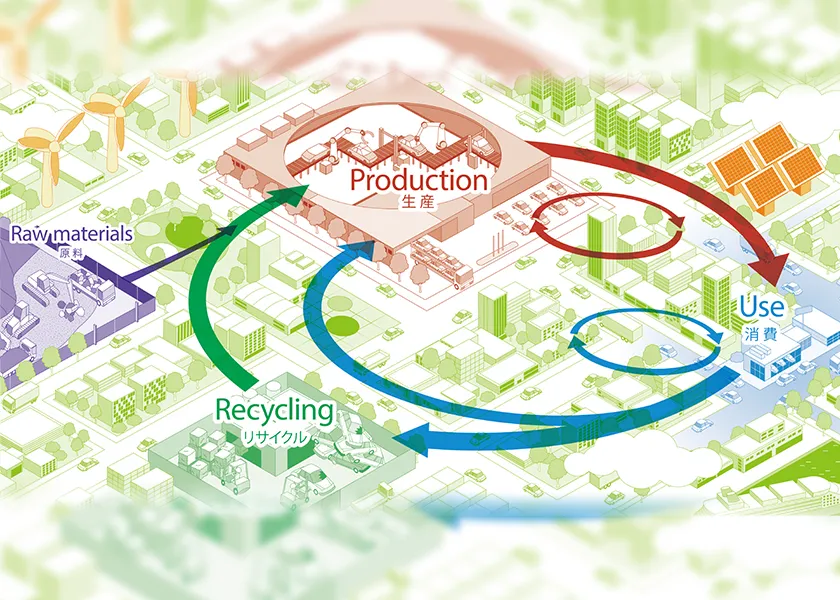Contents
Automotive Engineering Exposition 2024 YOKOHAMA has ended.
Thank you very much for your attendance.
JSAE Special Exhibits
Gathering the collective wisdom of the automotive industry for carbon neutrality and the recycling-oriented society of the future
As we face up to “The triple planetary crisis” of climate change, biodiversity loss, and pollution, we have been reminded that the planet is a finite resource.
Over the past few years, Japan and many other countries and regions around the world have begun to accelerate their efforts toward achieving carbon neutrality by 2050 and realizing a sustainable economy through changing and improving the nature of society. The keys to these efforts are creative collaboration and the circular economy.
To successfully implement these efforts, we must move on from the conventional linear process of resource exploitation, manufacturing, and disposal, to a socially oriented circular system focused on the 4Rs, which supplements the well-known concept of the 3Rs (reduce, reuse, and recycle) with a fourth “R”: renewable. The realization of a socially oriented circular system is not simply a question of recycling waste. Each and every one of us must shift our value standards toward responsible manufacturing and responsible use. Progress toward decarbonization that focuses on the whole vehicle lifecycle depends on us questioning conventional wisdom, looking at things from new perspectives, and taking on the challenges involved through a process of creative collaboration with new partners.
We must ask ourselves, “What technologies will make people and the world happy?” and work to build new value chains with these partners. We hope that everyone involved in the world of cars can meet at the Automotive Engineering Exposition 2024 and showcase our collective wisdom.

Realizing a sustainable circular society through technological progress and new standards of values!
Over the past year, efforts related to automotive resource recycling have gained increasing momentum on a global basis, especially in Europe. Examples include new proposals for more stringent end-of-life vehicle (ELV) regulations affecting vehicle design and scrapped vehicle management, and the implementation of battery regulations covering the whole lifecycle from battery material procurement to the design and production processes, re-use, and recycling. In contrast, although the vehicle recycling rate in Japan is reported to be 99%, this includes thermal recycling that simply re-uses the heat generated by burning those recycled materials. As approximately 60% of plastic materials are thermally recycled, we need to reduce this rate and return more materials to circulation. This year's Yokohama exposition puts the spotlight on material and chemical recycling technologies, focusing on plastics. Through this exposition, our goal is to create an ideal forum for the whole industry to come together and consider the nature of sustainable resources to help achieve a recycling-oriented circular society.
- Venue
-
YOKOHAMAPACIFICO Yokohama 1Floor, North Hall
ONLINEONLINE Exposition Website
Exhibit collaborators and organizations (in alphabetical order)
DENSO CORPORATION/Honda R&D Co.,Ltd. /JATCO Ltd. /Kobe Steel, Ltd./Mazda Motor Corp./REVER CORPORATION/Saitama Prefecture(I'll Clean-Tech CO.,LTD/Um-Welt Japan CO.,LTD/ECO KEIKAKU CO.,LTD/ORIX Environmental Resources Management Corporation/Environment Service CO.,LTD/TSUNEISHI KAMTECS CORPORATION/YAMANAKA CO.,LTD/YORII COMPOST CORPORATION)/SUBARU corporation /Sumitomo Chemical Co., Ltd./Toray Industries, Inc./TOYOTA AUTO BODY CO.,LTD./Toyota Motor Corporation/Yamaha Motor Co., Ltd./ZEPHYR CORPORATION
